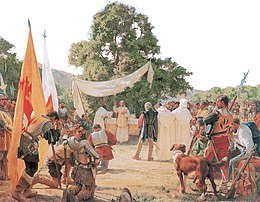
Back Heilige Messe ALS القداس الإلهي Arabic القداس الالهى ARZ Misa AST Švėntas Mėšės BAT-SMG Імша BE Імша BE-X-OLD Oferenn BR Misa BS Missa Catalan

The Mass is the central liturgical service of the Eucharist in the Catholic Church, in which bread and wine are consecrated and become the body and blood of Christ.[1][2] As defined by the Church at the Council of Trent, in the Mass "the same Christ who offered himself once in a bloody manner on the altar of the cross, is present and offered in an unbloody manner".[3] The Church describes the Mass as the "source and summit of the Christian life",[4] and teaches that the Mass is a sacrifice, in which the sacramental bread and wine, through consecration by an ordained priest, become the sacrificial body, blood, soul, and divinity of Christ as the sacrifice on Calvary made truly present once again on the altar. The Catholic Church permits only baptised members in the state of grace (Catholics who are not in a state of mortal sin) to receive Christ in the Eucharist.[5]
Many of the other sacraments of the Catholic Church, such as confirmation, holy orders, and holy matrimony, are now generally administered within a celebration of Mass, but before the Second Vatican Council were often or even usually administered separately. The term Mass, also Holy Mass, is commonly used to describe the celebration of the Eucharist in the Latin Church, while the various Eastern Catholic liturgies use terms such as Divine Liturgy, Holy Qurbana, and Badarak,[6] in accordance with each one's tradition. Pope Benedict XVI's 2007 motu proprio Summorum Pontificum authorized under certain conditions, more widely than before, continued use of the 1962 form of the Roman Rite, which it called the Extraordinary Form of the Roman Rite, while it called the post–Vatican II form promulgated by Pope Paul VI in 1969 and revised by Pope John Paul II in 2002 the Ordinary Form.[7][8] On 16 July 2021 Pope Francis in his apostolic letter Traditionis custodes restricted the celebration of the Tridentine Mass of the Roman Rite and declared that "the liturgical books promulgated by Saint Paul VI and Saint John Paul II, in conformity with the decrees of Vatican Council II, are the unique expression of the lex orandi of the Roman Rite."[9]
The term "Mass" is derived from the concluding words of the Roman Rite Mass in Latin: Ite, missa est ('Go, it is the dismissal', officially translated as 'Go forth, the Mass is ended'). The Late Latin word missa substantively corresponds to the classical Latin word missio.[10] In antiquity, missa simply meant "dismissal". In Christian usage, however, it gradually took on a deeper meaning. The word "dismissal" has come to imply a mission.[11]
- ^ Schrader, Fr. Dylan. The Order of Mass (The Extraordinary Form of the Roman Rite) (PDF). Ipsissima Verba. pp. 1, 18.
- ^ Basalyga, Benjamin (1948). "The Divine Liturgy History: ORDER OF THE LITURGY". www.athanasius.com. Archived from the original on 2021-02-11. Retrieved 2021-02-13.
- ^ [1] John Hardon, Modern Catholic Dictionary
- ^ "Catechism of the Catholic Church - The sacrament of the Eucharist". www.vatican.va. Retrieved 2018-08-20.
- ^ "CCC, 'The Paschal Mystery'". Vatican.va. Archived from the original on 16 June 2012. Retrieved 26 June 2012.
- ^ Hovhanessian, Vahan (2011). "Badarak (Patarag)". The Encyclopedia of Christian Civilization. doi:10.1002/9780470670606.wbecc0112. ISBN 9781405157629.
- ^ "Extraordinary Form of the Mass | USCCB". www.usccb.org. Retrieved 2020-09-18.
- ^ "Letter to the Bishops that accompanied the Apostolic Letter "Motu Proprio data" Summorum Pontificum on the Roman liturgy prior to the reform of 1970 (July 7, 2007) | BENEDICT XVI". www.vatican.va.
- ^ Traditionis custodes, article 1
- ^ Herbermann, Charles, ed. (1913). . Catholic Encyclopedia. New York: Robert Appleton Company.
- ^ "Sacramentum Caritatis: Post-Synodal Apostolic Exhortation on the Eucharist as the Source and Summit of the Church's Life and Mission (22 February 2007) | BENEDICT XVI". www.vatican.va. Retrieved 2018-08-20.